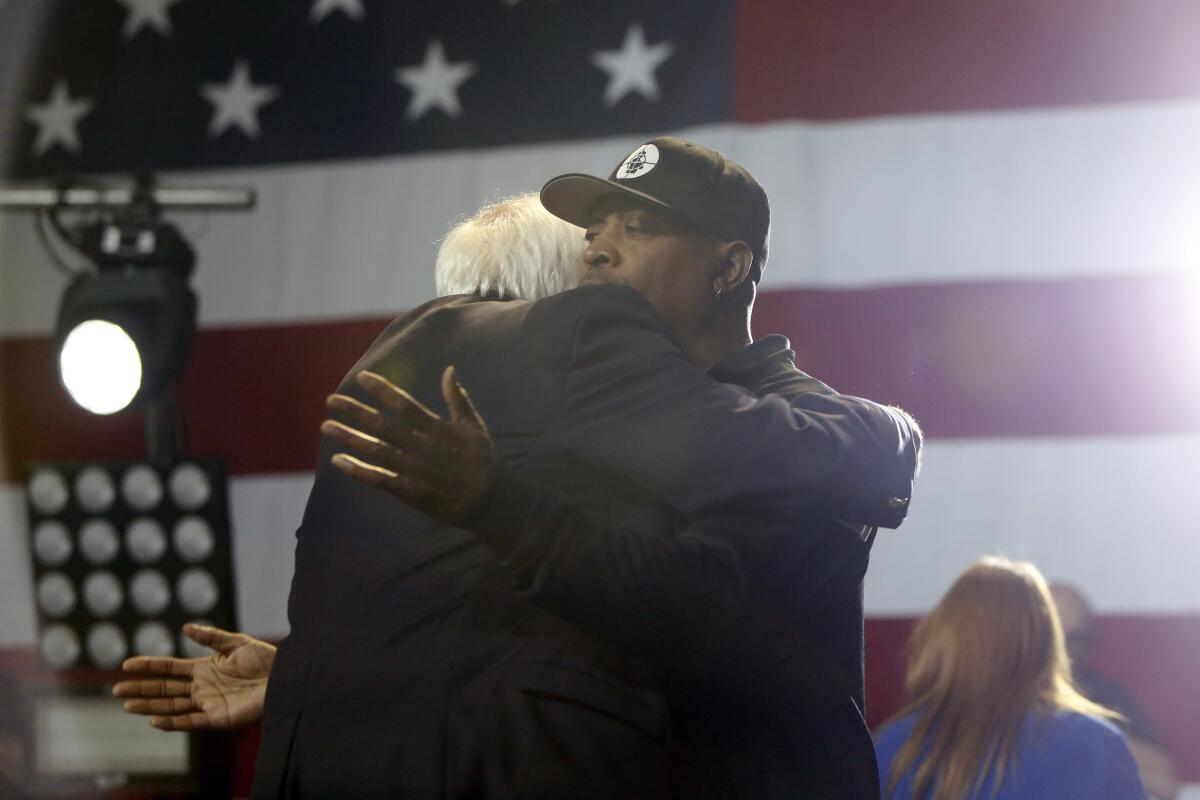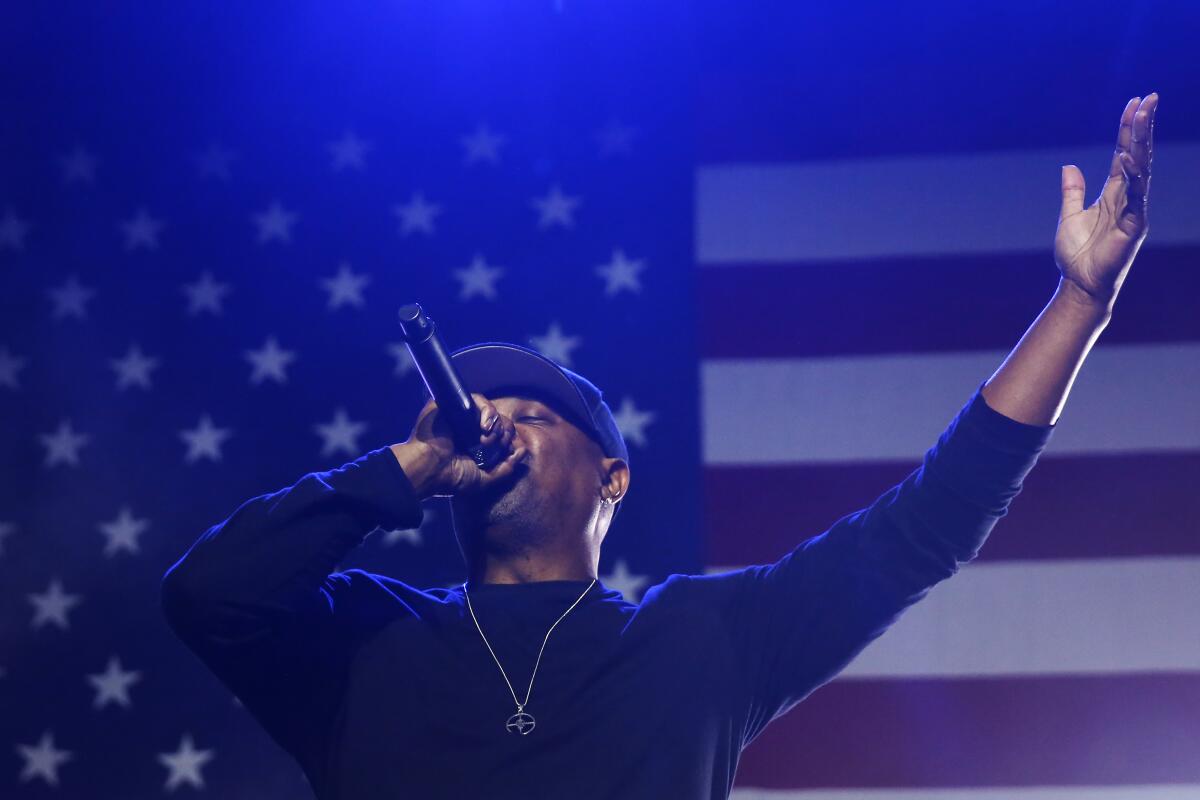From tiny clubs to packed arenas, musicians of all stripes are rocking the vote for Bernie Sanders

- Share via
“They say Bernie’s up there in age,” rapper Chuck D proclaimed to a packed crowd of 17,000 Bernie Sanders supporters at the Los Angeles Convention Center on Sunday night. “Hey, I’m 59 — I’m an old-ass rapper,” joked the leader of revolutionary hip-hop legends Public Enemy. “But it ain’t about us. It’s about y’all.”
Two days ahead of California’s Democratic presidential primary, the 78-year-old Sanders, after taking the stage to the thump of John Lennon and the Plastic Ono Band’s “Power to the People,” introduced Chuck D as someone “who has spoken truth to power for decades.” After his brief speech, Chuck and his four-man crew performed a 30-minute set featuring bits and pieces of such classic hip-hop agit-prop as “Bring the Noise,” “Black Steel in the Age of Chaos” and, fittingly, “Fight the Power.”
Timothy Alford Jr., 32, of Palmdale, said Chuck D’s endorsement of Sanders simply solidified his own.
“Public Enemy has been saying the same things as Sanders for 30 years,” Alford said.

Among musicians, Chuck D is far from alone for his full-throated support of the Democratic-Socialist-turned-Democratic-frontrunner. The Vermont senator has drawn endorsements from a wide range of Gen X and millennial rock musicians— from Vampire Weekend, the Strokes and Portugal. the Man to Jack White, Best Coast and Bon Iver. Many are not only supporting Sanders by word but also performing at fundraisers or other rallies: Vampire Weekend and Bon Iver played Sanders events in Iowa in January; the Strokes performed for him in New Hampshire, and neo-soul group Nathaniel Rateliff & the Night Sweats are playing to boost Sanders’ efforts in Minnesota on Monday on the eve of the Super Tuesday primaries.
Sanders is “the only non-corporate candidate, so by default, he’s the only person who you can trust what he’s saying,” the Strokes’ frontman Julian Casablancas told Rolling Stone. “Whatever energy an announcement can give, [we wanted] to get that attention to Bernie. That’s way more important. We would probably do anything he asked.”
Sonic Youth singer and bassist Kim Gordon has participated in politically and socially oriented rallies in years past, but this election has come out in public support for Sanders. Taking Sanders’ grassroots campaign ethic to heart, she invited her more than 300,000 Instagram followers to join her in canvassing precincts door-to-door last month in the San Fernando Valley.
“I feel like it’s kind of the bleakest moment or maybe the most hopeful moment right now,” she told The Times. “Or it could be both. Bernie is such an inspirational figure. He’s been saying the same thing for years, and he’s the only candidate who has grown the Democratic party, who has done outreach to the Latino community, to people who’ve never been approached, as well as to black communities. He really helped create this movement that’s bigger than any candidate.”
In addition to winning support in the rock community, Sanders also has won over a number of hip-hop artists, among them Cardi B., Lizzo, Run the Jewels’ Killer Mike, Anderson .Paak, Lil Yachty and rapper T.I., as well as pop stars including Miley Cyrus, Zedd and Ariana Grande.
Some musicians have lined up behind other candidates: Cher and singer/actress Rita Wilson — and her husband, Tom Hanks — are stumping for former Vice President Joe Biden, while John Legend, Melissa Etheridge, Rosanne Cash and Aimee Mann are backing Sen. Elizabeth Warren. John Mellencamp is supporting former New York mayor and media mogul Michael Bloomberg.
(Another notable exception: Chuck D’s longtime Public Enemy bandmate Flavor Flav, who was fired from the group after sending a cease-and-desist order to Sanders on Friday that accused the campaign of using Flav’s “unauthorized likeness, image, and trademarked clock” to promote the rally. On Sunday, Public Enemy announced in a statement that “Public Enemy and Public Enemy Radio will be moving forward without Flavor Flav. We thank him for his years of service and wish him well.”)
All these endorsements beg the question in 2020: What does such support mean in the age of social media? Unlike in decades past, when rock and pop stars’ support was considered essential to amplifying candidates’ public profiles or policy positions — it was virtually a rite of passage in recent decades when Bruce Springsteen would perform in support of Democratic presidential frontrunners — today politicians can reach out directly voters through Twitter, Instagram and Facebook posts and advertisements. Voters themselves also voluminously broadcast their own preferences to their own followers, whether those number in the dozens or in the millions.
For Cash, an outspoken activist for most of her life and the daughter of country music icon Johnny Cash, a tweet announcing her support for Warren wasn’t posted with any expectation it would suddenly push the 70-year-old former schoolteacher to the front of the Democratic pack.
“People are pretty entrenched these days, there’s not much dialogue,” Cash said. “I don’t know what impact I’ll have. If I make any waves, it’s a tiny ripple. What’s important to me is to participate in the process.”
“For any given celebrity or artist, I think their political impact is diluted because of the online ecosystem we have now,” said Nate Sloan, professor of musicology at USC. “I think the exception to that is endorsements by artists that are unexpected in some way.
“One would be rapper Killer Mike, who has been a really strong supporter of Bernie Sanders’ campaign. His endorsement has been particularly surprising — an African American inner-city rapper endorsing a left-wing Jewish socialist from Vermont. It reaches communities Sanders might not otherwise reach.”

At the same time, Sloan cited another artist who has more in common with Sanders — 74-year-old rock star Neil Young, who last month took his oath of U.S. citizenship so he can vote in the November election and soon thereafter posted a scathing attack on President Donald Trump, laying out his concerns about climate change, his animosity toward Trump and his support for Bernie Sanders.
“We’ve seen examples where certain artists making public statements about politics backfired,” USC’s Sloan said. “Lady Gaga was actually used by Trump in 2016 for her support of a Democratic candidate, and that became a rallying cry for how many people didn’t like her.
“Neil Young has a fan base that’s somewhat older, probably white, probably male — a lot of people who would be voting for Trump,” said Sloan. “Perhaps his letter may have more impact than one coming from Lady Gaga.”
What Gaga has that Young, Cash or other veteran musicians don’t, though, is millions of social media followers. Young has more than 450,000 Twitter followers, Cash has just under 120,000.
Gaga, by contrast, has 81 million, Taylor Swift has nearly 86 million, and 2016 Hillary Clinton advocate Katy Perry has more than 108 million,translating into massively greater potential reach for whatever issues or candidates they decide to support.
Swift notably ended her historically apolitical public profile during the 2018 Congressional midterm elections, endorsing Democratic Tennessee senatorial candidate Phil Bredesen and House of Representative candidate Jim Cooper.
Cooper won his race, while Republican Marsha Blackburn ultimately narrowly defeated Bredesen. Swift’s message urging her 120 million Instagram followers to vote, however, was followed by a wave of more than 434,000 new registrations — with nearly two-thirds from people under 30 — in the first five days after her post went up, according to Vote.org.
For all the political and cultural divisiveness many have complained about in recent years, some say they’ve found a measure of comfort in actively engaging with politics ahead of the November election.
L.A. singer-songwriter Julia Holter was one of a handful of local indie musicians who performed on Feb. 24 at an unofficial fundraiser for Sanders at the Lodge Room in Highland Park. “It was a very warm feeling at the show — just people there for a cause and not taking themselves seriously, no divas,” she said. Filled to capacity, the event ended up raising $10,000 for the Sanders campaign.
“In today’s climate,” Holter said, “it’s important for people to feel something positive.”
More to Read
The biggest entertainment stories
Get our big stories about Hollywood, film, television, music, arts, culture and more right in your inbox as soon as they publish.
You may occasionally receive promotional content from the Los Angeles Times.











